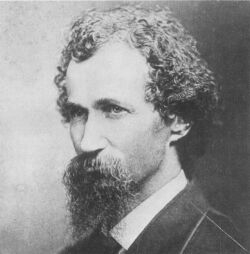Analysis of To a Mountain
Henry Kendall 1839 (Australia) – 1882 (Sydney)
To thee, O father of the stately peaks,
Above me in the loftier light -- to thee,
Imperial brother of those awful hills
Whose feet are set in splendid spheres of flame,
Whose heads are where the gods are, and whose sides
Of strength are belted round with all the zones
Of all the world, I dedicate these songs.
And if, within the compass of this book,
There lives and glows ONE verse in which there beats
The pulse of wind and torrent -- if ONE line
Is here that like a running water sounds,
And seems an echo from the lands of leaf,
Be sure that line is thine. Here, in this home,
Away from men and books and all the schools,
I take thee for my Teacher. In thy voice
Of deathless majesty, I, kneeling, hear
God's grand authentic Gospel! Year by year,
The great sublime cantata of thy storm
Strikes through my spirit -- fills it with a life
Of startling beauty! Thou my Bible art
With holy leaves of rock, and flower, and tree,
And moss, and shining runnel. From each page
That helps to make thy awful volume, I
Have learned a noble lesson. In the psalm
Of thy grave winds, and in the liturgy
Of singing waters, lo! my soul has heard
The higher worship; and from thee, indeed,
The broad foundations of a finer hope
Were gathered in; and thou hast lifted up
The blind horizon for a larger faith!
Moreover, walking in exalted woods
Of naked glory, in the green and gold
Of forest sunshine, I have paused like one
With all the life transfigured: and a flood
Of light ineffable has made me feel
As felt the grand old prophets caught away
By flames of inspiration; but the words
Sufficient for the story of my Dream
Are far too splendid for poor human lips!
But thou, to whom I turn with reverent eyes --
O stately Father, whose majestic face
Shines far above the zone of wind and cloud,
Where high dominion of the morning is --
Thou hast the Song complete of which my songs
Are pallid adumbrations! Certain sounds
Of strong authentic sorrow in this book
May have the sob of upland torrents -- these,
And only these, may touch the great World's heart;
For, lo! they are the issues of that grief
Which makes a man more human, and his life
More like that frank exalted life of thine.
But in these pages there are other tones
In which thy large, superior voice is not --
Through which no beauty that resembles thine
Has ever shone. THESE are the broken words
Of blind occasions, when the World has come
Between me and my Dream. No song is here
Of mighty compass; for my singing robes
I've worn in stolen moments. All my days
Have been the days of a laborious life,
And ever on my struggling soul has burned
The fierce heat of this hurried sphere. But thou,
To whose fair majesty I dedicate
My book of rhymes -- thou hast the perfect rest
Which makes the heaven of the highest gods!
To thee the noises of this violent time
Are far, faint whispers; and, from age to age,
Within the world and yet apart from it,
Thou standest! Round thy lordly capes the sea
Rolls on with a superb indifference
For ever; in thy deep, green, gracious glens
The silver fountains sing for ever. Far
Above dim ghosts of waters in the caves,
The royal robe of morning on thy head
Abides for ever! Evermore the wind
Is thy august companion; and thy peers
Are cloud, and thunder, and the face sublime
Of blue mid-heaven! On thy awful brow
Is Deity; and in that voice of thine
There is the great imperial utterance
Of God for ever; and thy feet are set
Where evermore, through all the days and years,
There rolls the grand hymn of the deathless wave.
| Scheme | Text too long |
|---|---|
| Poetic Form | |
| Metre | 1111010101 01100100111 01001011101 1111010111 1111011011 1111011101 110111011 0101010111 1101110111 0111010111 1111010101 0111010111 1111111011 0111010101 1111110011 111001101 1101010111 010110111 1111011101 1101011101 11011101001 010101111 1111110101 1101010001 1111000100 1101011111 0101001101 0101010101 0100011101 0101010101 0101000101 1101000101 110111111 11011001 1101001111 1101110101 111010101 0101010111 1111011101 11111111001 1101010101 1101011101 1101010101 1101011111 1101101 1101010011 1101110101 0101110111 1111010111 1101110011 1111010111 1011011101 01110100111 1111010101 1101110101 1101010111 0110111111 1101011101 1101010111 11011001001 01011100111 0111110111 111100110 1111110011 1101010101 11010111001 1111001111 0101010111 11111101 1110010100 1100111101 0101011101 0111110001 0101110111 011101001 1110010011 1101000101 1111011101 1100001111 11010100100 1111001111 110110101 110111011 |
| Closest metre | Iambic pentameter |
| Characters | 3,522 |
| Words | 664 |
| Sentences | 24 |
| Stanzas | 1 |
| Stanza Lengths | 83 |
| Lines Amount | 83 |
| Letters per line (avg) | 33 |
| Words per line (avg) | 8 |
| Letters per stanza (avg) | 2,748 |
| Words per stanza (avg) | 662 |
Font size:
Submitted on May 13, 2011
Modified on March 05, 2023
- 3:20 min read
- 101 Views
Citation
Use the citation below to add this poem analysis to your bibliography:
Style:MLAChicagoAPA
"To a Mountain" Poetry.com. STANDS4 LLC, 2024. Web. 29 Apr. 2024. <https://www.poetry.com/poem-analysis/17606/to-a-mountain>.


Discuss this Henry Kendall poem analysis with the community:
Report Comment
We're doing our best to make sure our content is useful, accurate and safe.
If by any chance you spot an inappropriate comment while navigating through our website please use this form to let us know, and we'll take care of it shortly.
Attachment
You need to be logged in to favorite.
Log In